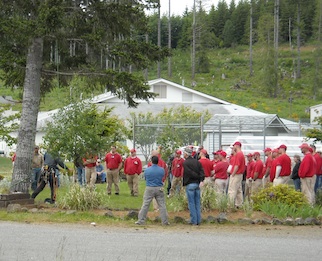Inmates Take Part in Tree Care and Management
 LITTLE ROCK, Wash. — Residents at the Cedar Creek Corrections Center in Washington State were given the opportunity to learn how to manage and care for trees through an arboriculture workshop.
LITTLE ROCK, Wash. — Residents at the Cedar Creek Corrections Center in Washington State were given the opportunity to learn how to manage and care for trees through an arboriculture workshop.
The workshop was part of the Sustainable Prisons Project, a partnership between Evergreen State College and the Washington State Department of Corrections.
The workshop provided an overview of a career option, which offenders could pursue after being released from their sentences, according to the state’s Department of Natural Resources, who joined in on the workshop.
The Department of Natural Resources joined the workshop to educate inmates on urban forestry and tree biology.
Members of the department’s Urban and Community Forestry program demonstrated how trees react to stresses and injury in predictable ways based on their biological growth responses.
The inmates also learned how to prune trees and were given a demonstration on climbing and how to safely work in trees.
The offenders who participated in the arboriculture workshop are members of the forestry crews at Cedar Creek Corrections Center, a minimum-security facility located in the woods of the Capitol Forest, and already had some experience working with trees.
The long-term goal of the program is to follow the workshop with a series of classes to help prepare offenders for the International Society of Arboriculture certification exam.
By having low-risk offenders participate in environmental sustainability programs, officials at the Department of Natural Resources said the hope is the projects will improve behavior and deepen individual and institutional investment in sustainability.
“It works toward rehabilitating and re-establishing the inmates into society once their prison term has been completed,” officials said.
The Cedar Creek Corrections Center is involved in a number of projects supporting the natural resource department’s tree planting and wildland firefighting, including recycling, composting, organic gardening and horticulture greenhouse programs.
Additional programs include beekeeping, water catchment basins, low-flush toilets, energy conservation and field crews.
